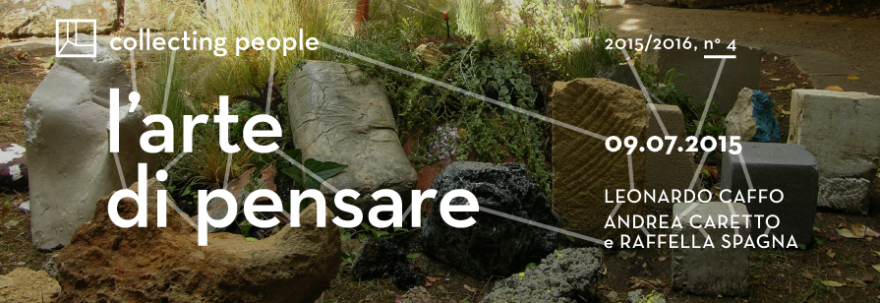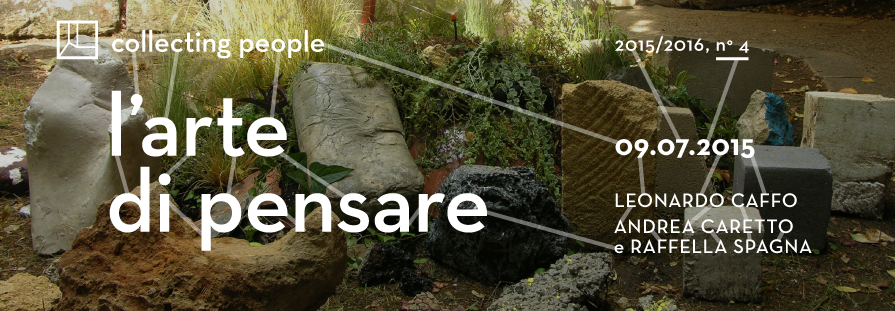collecting people / the art of thinking n°4

Shifting from the center. Thinking without anthropocentrism.
How can artistic and philosophical research identify ways of thinking about and implementing an ecological discourse?
Rethinking ecology and our relationship with the environment is one of today’s most pressing issues, not only with regard to artistic, philosophical, and scientific research, but above all, to daily life. The misconception that underlies this endeavor is thinking that it can be done without shifting from the center of the world and our knowledge as human beings. Darwin showed us that, like animals, humans are the result of natural evolution, but ousting anthropocentrism from our theories and practices is an operation not without friction. Rethinking humanity also means redefining the relationship of artistic and philosophical research with scientific knowledge and daily life. Could the key to the non-anthropocentric rethinking of humans be an aesthetic attitude? Aesthetics is the science of sensory knowledge. Sensitivity is always related to an individual or an experience in its particularity, not in its generality, so much so that we cannot have perceptions, emotions, or feelings that do not refer to an object or to a specific state. Aesthetics is also puts into play intellectual faculties that do not subsume the content of the experience under abstract categories, but takes on forms that are intertwined with the singularity. Knowledge that pays attention to sensitivity presents us with the inability to reduce the non-human world to an indistinct one where mankind can act arbitrarily. Far from being seen as a useless surplus, the aesthetic attitude becomes central, because it allows us to have different views of the world and find other ways of living in contact with the heterogeneous plurality of individuals that populate our environment, tearing the veil of abstraction that has heretofore characterized the terms of the relationship between man, animals, plants, and matter materials. At the Diogene Tram, Leonardo Caffo presents his philosophical research on the rethinking of humanity, by looking at Darwin through Nietzsche, and analyzing the intersecting terrain of the post-human in a complex network of exchanges with the artistic experiences that have anticipated the need for a paradigm shift, placing the unimaginable for all eyes to see. On the strength of a kind of thinking capable of engaging with art, Leonardo Gruner dialogues with Andrea Caretto and Raffaella Spagna, whose artistic practices research an exploration free of reality, in an attempt to relate, through a physical-perceptive experience that is primarily aesthetic, with the real landscape and the networks of connections that characterize the underlying “epigenetic landscape”.
Leonardo Caffo received a Ph.d in Philosophy from the University of Turin. He was the director of the Animal Philosophy seminar of the DAAD Program at the University of Kassel, a fellow of the Oxford Centre for Animal Ethics, and a guest researcher at Jawaharlal Nehru University in New Delhi, India. He has founded several philosophical journals including Animal Studies, the Italian Journal of Analytic Philosophy Jr, Gallinae in Fabula Onlus of which he is the secretary, and Animot: The Other Philosophy, of which he is co-director. His areas of research include social ontology and realism, animal studies, cognition, applied ethics, philosophy of anarchism, and architecture. He has participated in numerous Italian and international conferences, presented his research in many cities and in different interdisciplinary contexts, and he keeps a blog as a philosopher, activist, and writer (http://leonardocaffo.org/). His books and published writing include: The Anthropocentrism of Anti-Realism (Philosophical Readings, Spring, 2014), ll maiale non fa la rivoluzione. Manifesto per un antispecismo debole (Pigs do not make a revolution. Manifesto for a weak anti-speciesism), (Sonda, Casale Monferrato, 2013), Naturalism and Constructivism in Meta-ethics (with S. Bonicalzi and Sorgon, Cambridge, Newcastle, 2014), A come Animale (A like Animal) (2015, with Cimatti, Bompiani, Milan), and An Art for the Other (with Sonzogni, Lantern Books, New York, 2015).
Andrea Caretto (Turin, degree in Natural Science) and Raffaella Spagna (Rivoli, degree in Architecture) conceive of art as a form of research, a way to freely investigate the multiple dimensions of reality: formal and qualitative features of matter, as well as quantitative physical aspects, and philosophical and social issues. Their works are always the result of a “relational process” that evolves over time. Installations, collective actions, performances, or sculptures emerge from the complex network of relationships established with different elements (organic, inorganic, living, etc.) of the environment in which they operate. Their practice involves investigating the form of things, understood as an expression of forces embedded within a “relational field”. They have been working together regularly since 2002, exhibiting in public and private institutions in Italy and abroad, including their most recent solo shows: I Malus (2015, Cittadellarte – Pistoletto Foundation) Field Works_Wachau (2015, Kunstraumarcade, Mödling, Austria), Systemic Collection, (2012, GAM, Turin, Italy), Retour sans préavis/Back without Warning (2011, art3 Art Contemporain, Valence, France), and On ne peut pas descendre deux fois dans le même fleuve/You cannot step into the same river twice (2011, CAP – Centre D’Art Plastique, Saint Fons, France). They have participated in numerous group exhibitions and also curated several exhibitions: J’ai pris un pierre pour voir le monde (2015, Le Huit, Parigi), Meteorite in the Garden, (2014, Merz Foundation, Turin, Italy), Sic Vos Nos Vobis, PAV (2014, Parco di Arte Vivente/Park of Living Art, Turin, Italy), VIVRE(S) (2014, Domaine de Chamarande, France), We-traders – Cedo Crisi offro Città (2014, Toolbox, Turin). They have been artists in residence at: AIR Krems, 2015; Khoj International Artists’ Association, New Delhi, India, 2012; Moly Sabata – Albert Gleizes Foundation, Sablons, France, 2010/2011; and CAIRN, Musée Gassendi, Digne-les-Bains, France, 2008.
They collaborate with the Center for Inter-University Research IRIS (Institute for Interdisciplinary Research on Sustainability) at the University of Turin and in Brescia, and with the Faculty of Education Sciences at the University of Turin. They live and work in Cambiano, a town near Turin.

